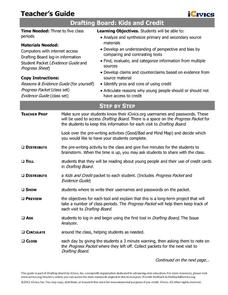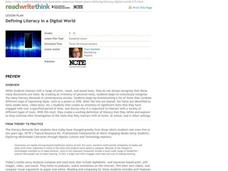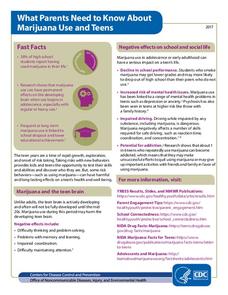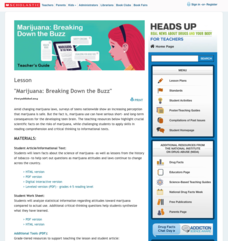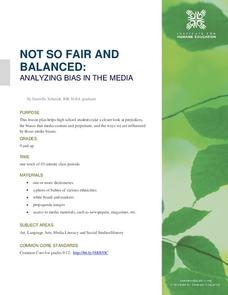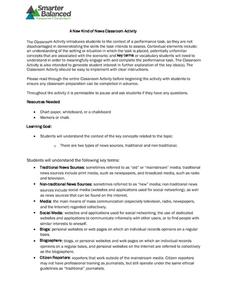University of Arizona
Found News Poems
Combine informational text and creative writing with one fun activity! Middle and high schoolers write found poems based on newspaper headlines that they find. The resource includes a thorough lesson plan and many links to articles that...
What So Proudly We Hail
Life, Liberty, and the Pursuit of Happiness: A Lesson on the Declaration of Independence
What does it mean to say that a right is unalienable? How did the founding fathers convey this revolutionary concept in the Declaration of Independence? Engage in a close reading and analysis of the Declaration of Independence, and...
iCivics
Drafting Board: Interest Groups
Does the influence of interest groups harm a political system? Your class members will analyze the role of interest groups in American politics, as well as consider the effect of perspective, bias, loyalty, and the First Amendment.
iCivics
Drafting Board: Kids and Credit
Should kids under the age of 18 be given access to credit cards? Learners identify pros and cons of using credit, develop claims based on evidence, and finally argue reasons for or against credit for minors.
iCivics
Drafting Board: Community Service
Should schools impose community service graduation requirements? In the final lesson of the Drafting Board series, learners solidify their practice of crafting an argument supported by sound reason and evidence.
K12 Reader
Slavery in the Constitution
Your young historians will read excerpts from three parts of the United States Constitution—Article One, the Thirteenth Amendment, and the Fourteenth Amendment—and discuss how they each address the issue of slavery.
The New York Times
Dark Materials: Reflecting on Dystopian Themes in Young Adult Literature
The Hunger Games. Maximum Ride. Why is so much of young adult literature so dark? What is the appeal of dystopian literature to young readers? The six activities in this resource ask kids to reflect on some of the reasons this genre has...
National Endowment for the Humanities
A Journalist’s Report: The Better Vision for Black Americans
After reading a series of primary source documents detailing the teachings of Martin Luther King, Jr. and Malcolm X, class members craft newspaper columns assessing the strengths and weaknesses of each man's vision, and present their...
Turabian Teacher Collaborative
Parts of Argument II: Article Critique
Break down the parts of argumentative writing with a critical thinking activity. High schoolers read an article of your (or their choice), and use a graphic organizer to delineate the ways the author structures his or her arguments.
Channel Islands Film
Island Rotation: Lesson Plan 4
Foster's Rule? Allopatric speciation? After watching West of the West's documentary Island Rotation, class members use Venn diagrams to compare endemic species on the Channel Islands with mainland related species. They then create a...
ReadWriteThink
Defining Literacy in a Digital World
What skills are necessary to interact with different types of text? Twenty-first century learners live in a digital world and must develop a whole new set of skills to develop media literacy. Class members engage in a series of...
Centers for Disease Control and Prevention
What Parents Need to Know About Marijuana Use and Teens
The teenage years find adolescents yearning for independence—and often isolating their parents from their everyday lives. Educate parents on the warning signs of marijuana use, including its effects on the brain and the likelihood of...
Scholastic
Marijuana: Breaking Down the Buzz
Teenagers get the real information about marijuana use based on the history of tobacco legislation and research. As they read an educational passage about marijuana laws, science, and changing attitudes, they address their preconceptions...
PBS
1000 Words
A picture really can speak a thousand words—no matter how old! Scholars become history detectives as they learn how to analyze historical photos and evidence to uncover the past. The fun hands-on activity makes history come alive through...
NPR
Is There Really an Immigration Line?
If you've ever looked at the US immigration system, you know that it is complex and a source of controversy. An insightful lesson plan encourages learners to conduct their own analyses of the US immigration system by asking them to...
Institute for Humane Education
Not So Fair and Balanced: Analyzing Bias in the Media
Life is not always fair. Who's heard that before? This same concept moves to a larger scale using prejudice and bias. Pupils discuss where prejudice attitudes derive and how they develop throughout life. Reading comprehension...
Shakespeare Globe Trust
Fact Sheet: The Third Globe
Hopefully the third time's a charm when it comes to rebuilding London's Globe Theatre! With an informational text, readers learn about the reconstruction of the theatre in the 1990s. They also discover how modern health and safety...
Shmoop
ELA.CCSS.ELA-Literacy.RL.11-12.6
It ‘s assessment check list time, and you have nothing to prove that your learners mastered the skill RL.11-12.6. Rest assured, here is a plan that is sure to appease your administrator. It offers solid examples on the difference between...
Shmoop
ELA.CCSS.ELA-Literacy.RL.11-12.5
What would happen if I structured this review by beginning in the middle of it? Or by flashing back to the dinner I had last night that gave me bad heartburn, and then transitioned into how the lingering burn of acid seeped into my...
Smarter Balanced
A New Kind of News
Newspapers and broadcast news. Social media, blogs, and blogospheres. Class members generate a list of news sources they use to get information about events. The big idea here is to introduce the necessary vocabulary and to establish a...
National Endowment for the Humanities
Charles Baudelaire: Poète Maudit (The Cursed Poet)
After learning the main ideas of the Decadent movement, students work in small groups to read and translate poems by the French poet Charles Baudelaire using basic etymology skills. They then read the accurate English translations to see...
National Endowment for the Humanities
Slavery and the American Founding: The "Inconsistency Not to Be Excused"
High schoolers examine slavery in the revolutionary and colonial eras of the United States. In this slavery lesson, students investigate the presence of slavery in early America, the language of the Constitution, and the intent of the...
National Endowment for the Humanities
From Courage to Freedom: Slavery's Dehumanizing Effects
Learners analyze slavery and its effects on humanity using Frederick Douglass' autobiography. In this slavery instructional activity, students analyze instances of reality and romanticized myth using a slave narrative. Learners explore...
National Endowment for the Humanities
From Courage to Freedom
Learners analyze Frederick Douglass' narrative about Christianity and slavery. In this Frederick Douglass lesson, young scholars read his slave narrative and analyze its word choice, imagery, irony, and rhetorical appeals. Learners...
Other popular searches
- Terminology
- Literary Terms
- Combining Like Terms
- Common Medical Terminology
- Termites
- Like Terms
- Medical Terminology
- Geometric Terms
- Simplest Form
- Math Terms
- Economic Terms
- Literary Terms Game





